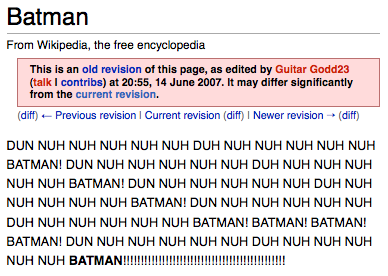Wikipedia to Unlock Frequently Vandalized Pages … Trolling Inevitable
Wikipedia, the definitive guide to everything that’s not always that definitive, will be unrolling a new editorial policy for the entries that are frequently targets of pranksters and biased writers (e.g. George W. Bush, the beaver, and in an amusing turn of meta-trolling, Troll (Internet)). Starting Tuesday at 7pm EST, instead of locking these commonly trolled pages, the online encyclopedia will enforce stricter editing with a new trial tool called “Pending Changes” (formerly called “Flagged Protection”).
So what does this process entail?
Moka Pantages explains in a Wikimedia blog post:
Articles that are frequently subjected to malicious edits have long been locked, sometimes for years, and protected from editing by new and anonymous users. Over the last year, the Wikimedia Foundation and volunteers from the community have been working to develop Pending Changes, a softer alternative to these editing restrictions. At present, only about 0.1 percent of the 3.3 million articles on the English Wikipedia are under edit protection. This tool should help reduce disruptive edits or errors to articles while maintaining open, collaborative editing from anyone who wants to contribute.
When Pending Changes is applied to an article, the article will be open for editing by anyone, including anonymous and new users. When edits are made by new or anonymous users, changes will be reviewed before they appear on the main version of the article. Anyone can view these proposed edits by clicking on the “Pending Changes” tab alongside the “Edit” and the “History” tabs. In addition, by scrolling over the magnifying glass icon, you can quickly see exactly how many changes are pending review.
This process will only initially apply to 2,000 pages, selected by the Wikipedia community at large. It is largely aimed toward anonymous writers and newcomers; the idea is to generate proper, long-term participation with an accountable online identity.
Whether this will encourage newbies to compose or edit articles, we’ll just have to see. There’s bound to be an outcry over the editorial authority vested in the senior Wikipedia users. Especially since the exodus of 49,000 editors in January to March 2009 (compared to 4,900 a year earlier) as reported by the WSJ, we’re essentially talking about an oligarchy of hardcore Wikiheads being created here. Power is always dangerous in the hands of few.
I’m skeptical as to whether the unlocked pages will stay unlocked for long. Seriously, I’ve seen the patience and planning that goes into the art of master trolling: 4chan-goers will bide their time, editing as normal, until they’ve all become trusted members of the Wikipedia community. Then … BAM! No going back.
Read more about the changes made to the editorial policy on this Wikimedia Q&A sheet.
(via slashdot; title image via wikipediavandalism)
Have a tip we should know? tips@themarysue.com
